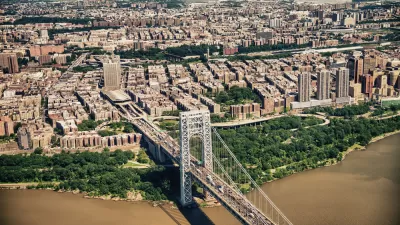Conservatives are becoming more visible within the smart growth movement; they differ in some ways both from liberal smart growth activists and from conventional conservatives.

There is finally a new blog, Smart Growth for Conservatives, focusing on issues of interest to those of us who generally support smart growth and new urbanism, and yet are less politically liberal than most people who do so.
How are conservative smart growthers (or CSGs) similar to their more liberal allies? Like environmentally minded critics of sprawl, CSGs oppose government subsidies for sprawl and sprawl-generating government regulations. In particular, quite a few of the new blog's posts focus on wasteful sprawl-generating road spending.
Having said that, CSGs do tend to differ from other smart growth supporters in a couple of ways. First, they tend to be fiscal conservatives, and thus skeptical of public amenities that are nice to have but perhaps not absolute necessities. As a result, they are less consistently supportive of public spending on public transit and pedestrian/bicycle facilities than liberals might be. Second, some issues that are generally part of today's liberal agenda are deemphasized by CSGs. In particular, CSGs are less likely to discuss climate change or social diversity than liberal new urbanists. I also suspect that CSGs are less likely to support smart growth regulations such as Oregon's growth boundaries; but since most Americans don't live in Oregon, CSGs aren't as obsessed with these regulations as are conventional pro-sprawl conservatives.
Of course, CSGs differ among themselves. Some CSGs are (as Mitt Romney might say) "severe" fiscal conservatives, and thus tend to be skeptical of all large-scale government expenditures. Personally, I am more of a Nixon Republican - which is to say, although I am less pro-regulation and egalitarian than many liberals, I am willing to support government spending not just as an "investment" (whatever that means) but as a public amenity akin to parks and schools.

Alabama: Trump Terminates Settlements for Black Communities Harmed By Raw Sewage
Trump deemed the landmark civil rights agreement “illegal DEI and environmental justice policy.”

Study: Maui’s Plan to Convert Vacation Rentals to Long-Term Housing Could Cause Nearly $1 Billion Economic Loss
The plan would reduce visitor accommodation by 25% resulting in 1,900 jobs lost.

Planetizen Federal Action Tracker
A weekly monitor of how Trump’s orders and actions are impacting planners and planning in America.

Wind Energy on the Rise Despite Federal Policy Reversal
The Trump administration is revoking federal support for renewable energy, but demand for new projects continues unabated.

Passengers Flock to Caltrain After Electrification
The new electric trains are running faster and more reliably, leading to strong ridership growth on the Bay Area rail system.

Texas Churches Rally Behind ‘Yes in God’s Back Yard’ Legislation
Religious leaders want the state to reduce zoning regulations to streamline leasing church-owned land to housing developers.
Urban Design for Planners 1: Software Tools
This six-course series explores essential urban design concepts using open source software and equips planners with the tools they need to participate fully in the urban design process.
Planning for Universal Design
Learn the tools for implementing Universal Design in planning regulations.
Caltrans
Smith Gee Studio
Institute for Housing and Urban Development Studies (IHS)
City of Grandview
Harvard GSD Executive Education
Toledo-Lucas County Plan Commissions
Salt Lake City
NYU Wagner Graduate School of Public Service




























